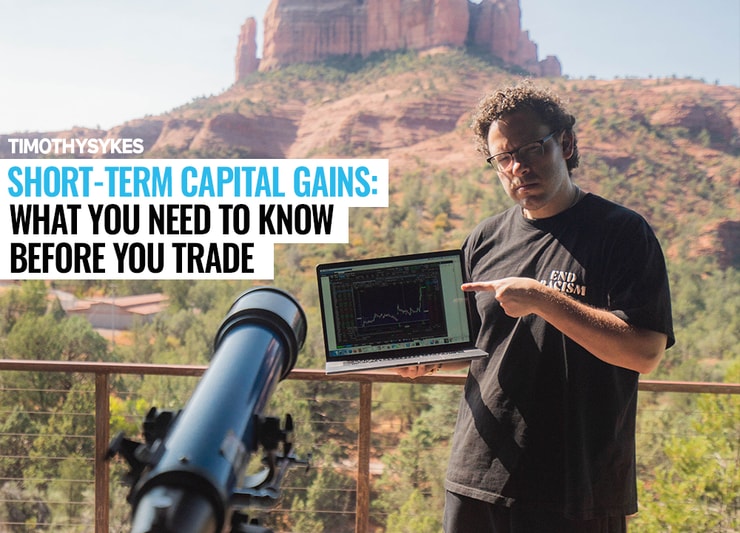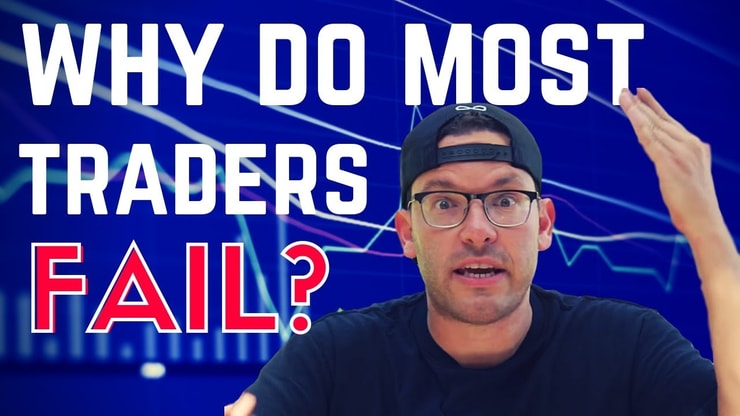If you have any plans of making money day trading, you need to know about the short-term capital gains tax.
This is non-negotiable. Every successful trader has to pay taxes. It’s illegal not to.
I know. Taxes are sort of a boring subject. But this is necessary information.
It reminds me of when I filmed my video on how to “Read SEC Filings” with Michael Goode, my first millionaire student.* It’s boring stuff but essential to understanding the market.
If you’re here to learn about taxes, you’ve probably made some money trading stocks or are expecting to. Also, note that this is all for informational purposes only. Have serious questions? Consult a licensed tax professional in your area.
And remember to stay safe. Don’t let early profits inflate your ego or the market will humble you.
If you’re reading this before making money, that’s the right mindset. Always prepare for the future by studying and staying educated.
Everyone has to pay taxes. So getting a jump start on what you might expect can only help you in the future.
Let’s go over the short-term capital gains tax and what you should know before trading.
Table of Contents
- 1 What Is a Short-Term Capital Gain?
- 2 Long vs. Short-Term Capital Gain: What’s the Difference?
- 3 Short-Term Capital Gain Tax Rates
- 4 How Are Short-Term Capital Gains Calculated?
- 5 How to File for Short-Term Capital Gains
- 6 Short-Term Losses
- 7 Frequently Asked Questions About Short-Term Capital Gains
- 8 Short-Term Capital Gains: The Bottom Line
What Is a Short-Term Capital Gain?

When you sell a “capital asset” for a profit, that’s considered a capital gain.
Capital assets include stocks, bonds, real estate, and precious metals — just to name a few.
I trade penny stocks and teach my students to do the same. So I’m most interested in short-term capital gains for stocks.
If a trader sells a position for a profit, the money they make is taxable by the U.S. government.
A big factor that determines your capital gains tax rate is how long you held the asset.
Long vs. Short-Term Capital Gain: What’s the Difference?
The amount of time you hold a stock will influence your tax rate.
Any asset you hold for more than a year is long term. If you hold a stock for a year or less, that’s considered short term.
I’m a day trader, so I typically hold positions for a few minutes. Sometimes I’ll make a swing trade and hold overnight but rarely longer.
That means almost all my capital gains are short term.
Long-term gains are usually taxed less — the rate could be anywhere between 0%–20%.
The government files short-term capital gains as regular income. That means you could pay 10%–37%, depending on your income bracket.
Again, that’s just a rough idea. Consult a pro for assistance with taxes. It’s complex stuff, and they’re trained for that.
Anyway, I guess if you want to pay less in taxes you could just hold your positions for more than a year.
That doesn’t work for me. The stocks I play are volatile. I have no idea what they’ll do in the next few minutes. Some of these companies could be gone in a year. And I’m OK with paying taxes. Get used to it.
Years of studying and experience are what help me to profit off of these sketchy stocks.* Paying higher taxes seems like a minimal risk compared to penny stock volatility. Need help surviving volatile markets? Check out my no-cost “Volatility Survival Guide.” Day trading is no joke — prepare for the wild ride.
We’ve just scratched the surface on short-term capital gains and taxes. Let’s dive into more specifics.
Short-Term Capital Gain Tax Rates

As I said before, you can expect to pay anywhere from 10%–37% in taxes. But know that these numbers can change yearly. Stay up to date on tax legislation.
State Taxes on Short-Term Capital Gains
Up until now, we’ve been discussing federal taxes. Your state government may also want a piece of the pie.
Tax rates vary by state. Make sure to research the rules for where you live. Making a mistake on your taxes can be annoying — and costly.
All this can be confusing, I know. If you need help, contact a professional to walk you through the process.
Special Rates and Exceptions
I have good news and bad news … I’ll give you the bad news first.
If you’re killing it in the stock market and making boatloads of cash, you might need to pay extra taxes.
The net investment income tax, or NIIT, can apply if you exceed the income level for your bracket. It’s just an extra 3.8%, but it’s important to know if you qualify.
The good news is that some U.S. states don’t tax capital gains.
If you live in one of those areas you’ll only have to pay the federal capital gains tax. That might be something to think about if you’re looking to move.
See how education can help you navigate the financial industry? Keep reading to learn more.
How Are Short-Term Capital Gains Calculated?
You’re only taxed on realized profit.
That means until you sell your position, you don’t pay any taxes on it.
Once you sell a stock for more than you bought it — including commission — the government can tax the profit.
And withholding taxable income is illegal, so listen up…
How much you’re taxed depends on a few different factors.
First of all, what kind of asset are you selling? We’ll stick to stocks for this post.
Then the government wants to know how you’re filing — single, married, head of the household.
No, Uncle Sam doesn’t want to know if you’re available. The government taxes people differently based on dependents and other factors.
It also matters which tax bracket you’re in. Your total income decides your bracket.
I could post a table to help you figure it out, but that’s good research for you to do. Plus, the government can change the brackets annually. There are lots of tax calculators out there. Do your research to find an accurate one for the year in which you’re filing.
How to File for Short-Term Capital Gains

For the most up-to-date information, visit the IRS website. And again, if you have any questions, find a licensed professional in your area.
The IRS is specific to U.S. taxes. If you live in a different country, you’ll file elsewhere.
I can’t stress enough how important it is to understand this aspect of the stock market. It’s essential to build your knowledge account before you think about your trading and bank accounts.
Making money from buying and selling stocks won’t mean much if the IRS shows up at your door. That’s a rookie move.
Short-Term Losses
“But Tim, I don’t have any short-term capital gains.”
OK, let’s say your trading isn’t going so well and you’ve been losing money.
Most traders lose, so it’s not much of a stretch…
You can potentially deduct the money you lose in the market from the rest of your income. That means you could potentially pay less in taxes.
According to the IRS website, traders can deduct up to $3,000 in losses. And if you lose more than that, you may be able to deduct further losses from next year’s income.*
There are exceptions to this. Wash sales can eliminate the tax loss incentive.
A wash sale is when someone sells an underperforming position for a loss. Then they buy a similar stock at a lower price. The rule tries to prevent tax-loss selling.
Speak to a professional to understand whether you can deduct your trading losses from your taxes and how much you can deduct.
Taking too many losses lately? Time to slow it down and study harder. Get into my 30-Day Bootcamp to help you build a great trading foundation day by day.
Frequently Asked Questions About Short-Term Capital Gains
Of course you have more questions about short-term capital gains. I’ll do my best to answer…
More Breaking News
- Valero Energy’s Stock Surge: Is It a Temporary Spike or a Sustained Growth?
- SOFI Stock Rides Higher After Landmark Membership Achievement: What Does It Mean For Investors?
- Is Jayud Global Logistics Poised for a Comeback? Riding the Recent Market Waves
Do Investors Who Earn Money From IRAs Have To Pay a Short-Term Capital Gains Tax?
This is a better question for a tax pro. From my understanding, some IRAs aren’t taxed until you start taking the money out. But once you cash in, the government can tax your realized gains as regular income. But I’d ask a licensed accountant for more info.
Are Dividends Considered Capital Gains?
The government classifies dividends as capital gains. You’ll have to pay taxes on them when it comes time to file.
When Are Short-Term Capital Gain Taxes Due?
This varies from year to year and where you live. Typically, April 15 is Tax Day and the deadline for filing and paying your taxes. But that date can change. For example, the U.S. government pushed the federal filing date for 2020 taxes to May 17, 2021, due to the pandemic. Dates to file state taxes differ based on location. Do your research to find out when to file.
Short-Term Capital Gains: The Bottom Line

If you plan to make money in the stock market, this is something you must know.
Sure, taxes are a boring topic, and no one gets excited about paying them. But this is a reality of the industry and life.
There are rules you have to follow no matter what you do. There will always be taxes no matter how you make money.
But jumping on your education early can lead to a clearer path in the future. Just by reading this post, you’ve laid the tracks for future success. But it’s not over just yet.
Being successful as a day trader takes a lot of hard work and experience. If you think you have what it takes, apply to my Trading Challenge.
I don’t accept everybody. If you’re just looking for hot picks, this isn’t the place for you. All my millionaire students studied for months and years to get where they are today.**
Get the right attitude and start studying. Education is your biggest asset whether you’re learning about short-term capital gains or your go-to patterns. Study up!
Have you had to file for capital gains tax? Is this your first introduction? Comment below, I love to hear from all my readers!
Disclaimers
*Note: This is in no way legal or financial advice. Always consult a licensed professional in your state or jurisdiction before making tax or legal decisions.
**Please note that these kinds of trading results are not typical. Most traders lose money. It takes years of dedication, hard work, and discipline to learn how to trade. Individual results will vary. Trading is inherently risky. Before making any trades, remember to do your due diligence and never risk more than you can afford to lose.







Leave a reply